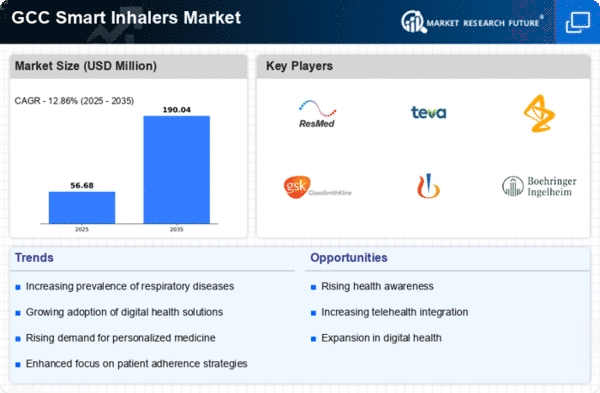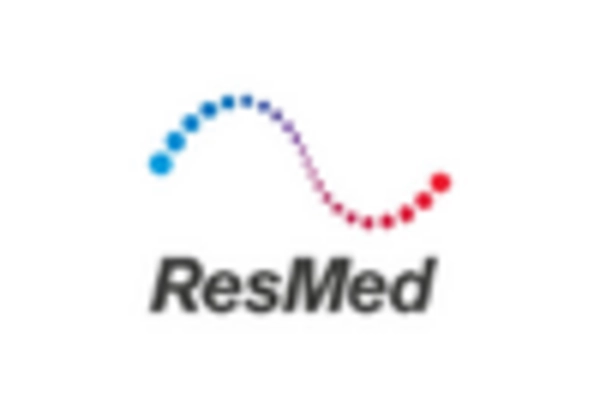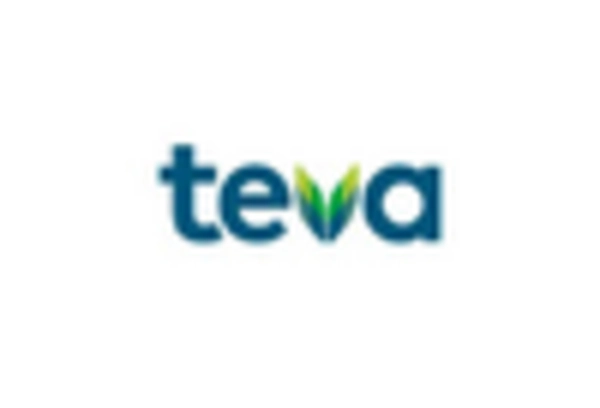Government Initiatives and Funding
Government initiatives aimed at improving healthcare infrastructure in the GCC region are driving the smart inhalers market. Various health ministries are investing in innovative healthcare solutions to enhance patient care and reduce healthcare costs. For instance, funding for research and development in digital health technologies is increasing, which supports the advancement of smart inhalers. These initiatives are likely to foster collaboration between public and private sectors, leading to the development of more effective inhaler technologies. The smart inhalers market stands to gain from these investments, as they facilitate the introduction of new products and improve access to existing solutions.
Shift Towards Personalized Medicine
The shift towards personalized medicine is reshaping the landscape of the smart inhalers market. As healthcare moves away from a one-size-fits-all approach, there is a growing emphasis on tailored treatment plans that consider individual patient needs. Smart inhalers can collect data on patient usage patterns and environmental factors, enabling healthcare providers to customize treatment strategies effectively. This trend is particularly relevant in the GCC region, where diverse populations may respond differently to standard therapies. The smart inhalers market is expected to thrive as personalized approaches become more mainstream, potentially leading to better health outcomes and patient satisfaction.
Growing Awareness of Medication Adherence
There is a growing awareness regarding the importance of medication adherence among patients and healthcare providers in the GCC region. Non-adherence to prescribed inhaler regimens can lead to exacerbations of respiratory conditions, resulting in increased healthcare costs and poor patient outcomes. Smart inhalers, which often include features such as reminders and usage tracking, are becoming essential tools in promoting adherence. The smart inhalers market is likely to expand as healthcare stakeholders recognize the value of these devices in improving patient compliance and overall health management.
Rising Prevalence of Respiratory Diseases
The increasing incidence of respiratory diseases in the GCC region is a primary driver for the smart inhalers market. Conditions such as asthma and chronic obstructive pulmonary disease (COPD) are becoming more prevalent, with estimates suggesting that around 10% of the population suffers from asthma. This growing patient base necessitates innovative solutions for effective management. Smart inhalers, equipped with digital health technologies, offer enhanced monitoring and adherence features, which are crucial for managing these chronic conditions. The smart inhalers market is thus positioned to benefit from this trend, as healthcare providers and patients seek more effective management tools to improve health outcomes.
Integration of Digital Health Technologies
The integration of digital health technologies into the healthcare ecosystem is significantly influencing the smart inhalers market. With the rise of telemedicine and mobile health applications, patients are increasingly utilizing digital platforms for health management. Smart inhalers, which often connect to mobile apps, provide real-time data on medication usage and environmental triggers. This connectivity not only enhances patient engagement but also allows healthcare providers to monitor adherence and adjust treatment plans accordingly. The smart inhalers market is likely to see substantial growth as these technologies become more prevalent, with projections indicating a market expansion of over 20% in the next five years.
















